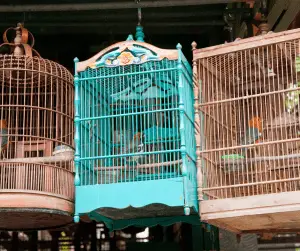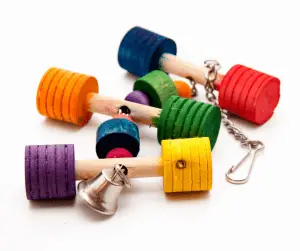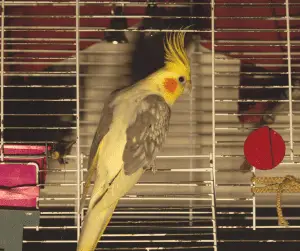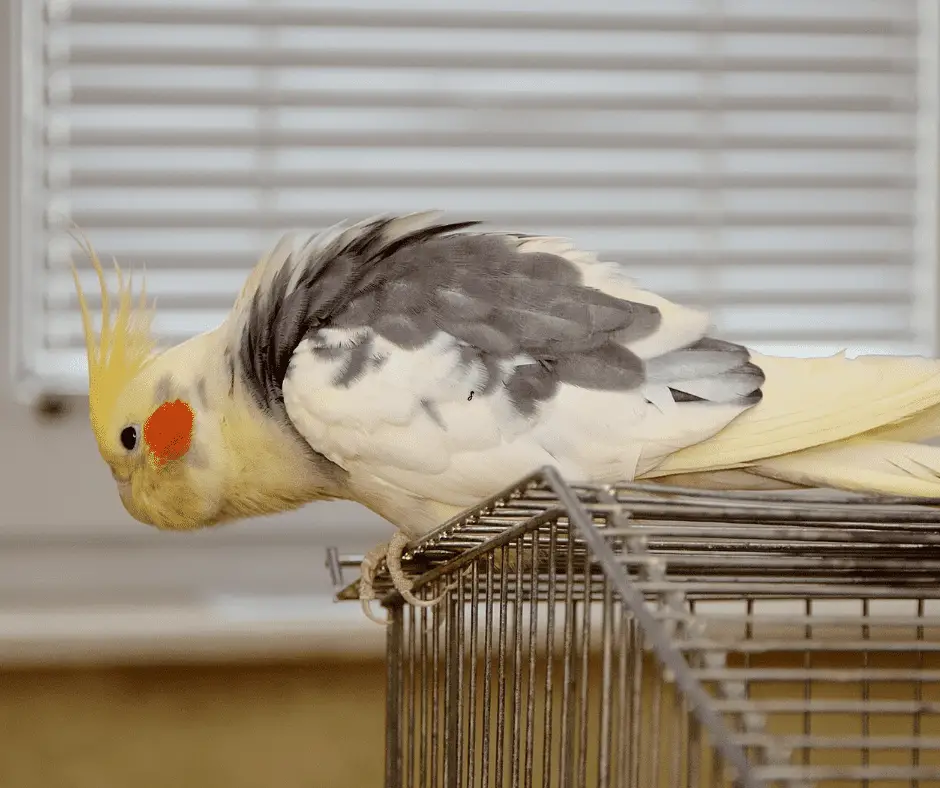Cockatiels are wonderful, social creatures that make great pets. They originate from Australia and are closely related to cockatoos. Cockatiels are very easy to take care of and only require a few simple things to stay healthy and happy. How to keep a cockatiel warm? One of the most important things you can do for your cockatiel is to make sure it always has a warm place to stay.
How to Keep a Cockatiels Warm?
Our pet birds are such a joy to have around, and we want to make sure they are always comfortable, especially during the cold weather. Here are ten tips on how to keep your pet bird warm:
1. Get a cockatiel-sized cage.

Cockatiels need plenty of space to move around and exercise, so make sure the cage you get is big enough for your bird to stretch its wings without hitting the sides. The minimum recommended size for a cockatiel cage is 18” x 18” x 24”, but bigger is always better.
2. Place the cage in a warm room.
Ideally, your cockatiel’s cage should be placed in a room that gets plenty of sunlight during the day. If this isn’t possible, try using an avian lamp or heat lamps to provide additional warmth.
To keep the room warm at night, you can use space heaters or an electric blanket (on the lowest setting). Just make sure the cage is not too close to the heat source to avoid your bird getting overheated.
3. Cover the cage at night.
Cockatiels are sensitive to cold drafts, so it’s important to cover the bird’s cage at night or when the temperature starts to drop outside. You can use a sheet, towel, or specially-made aviary cover as cage covers. Keep your birds warm by making sure the cover is snug against the cage and doesn’t have any gaps.
4. Make sure to provide fresh and clean water.
In the winter, your bird will likely drink more water to stay hydrated. Check the water dish multiple times a day to make sure it’s clean and refilled as needed. You can also put a little bit of warm water in the dish to help keep your bird’s water from freezing.
5. Add extra perches and toys.

Extra perches and toys help keep your cockatiel active and entertained, which is great for its physical and mental health—not to mention its overall happiness!
6. Use an air humidifier.
Dry air is not only uncomfortable for us but can also be harmful to our birds. A humidifier helps add moisture back into the air, making it more comfortable for everyone in the house.
7. Take your bird out of its cage regularly.
Letting your cockatiel out of its cage on a regular basis not only gives it some much-needed exercise but also allows it to spend some quality time with you, its favorite human!
8. Keep an eye on the temperature.
The temperature inside your home should never go below 60 degrees Fahrenheit (15 degrees Celsius) when your cockatiel is present—any lower than that, and you risk making your bird sick.
9. Monitor your bird’s health.
Pay close attention to your cockatiel’s behavior and appearance, as these can be signs that something is wrong. If you notice any sudden changes or anything out of the ordinary, take your bird to see an avian vet as soon as possible.
10. Seek professional help if needed.
If you’re ever unsure about something related to caring for your cockatiel, don’t hesitate to reach out to an avian veterinarian or other professional for guidance.
- SOLID AND DURABLE MATERIAL - Bird cage is made from thick, wrought iron. The sturdy metal frame construction is coated with spray powder paint that improves wear and corrosion resistance. The product does not contain any sharp edges that might hurt birds.
- SECURE AND FREE ACCESSORIES - The cage comes with two large front doors for birds to fly in & out. The long sliding bar latched firmly secures doors and keeps unattended pets from escaping. And with 3 polished wooden perches,4 plastic feeders.
- SPACIOUS INTERIOR LIVING ROOM & FLIGHT ROOM - This cage is spacious enough for birds to fly comfortably and can be beautifully decorated. Plenty of room to accommodate multiple small birds flying, exercising, or playing simultaneously. You are free to add more perches or toys as youd like.
- EASY CLEANING - It features a clean, hygienic slide-out tray that can be smoothly pulled out for cleaning & feeding. Besides, the bottom grille prevents pets from stepping on their own droppings. Beneath the grids, there is a clean, hygienic slide-out tray that can be smoothly pulled out and wiped down.
- HIGHLY MOBILE - Bird cage with stand that sits on four heavy duty rolling casters allows convenient movement. Easily relocate your pets and enjoy the outdoor weather.
What is the proper temperature range for cockatiels?

The ideal temperature for cockatiels is between 65 and 85 degrees Fahrenheit (18 to 29 degrees Celsius). If the temperature inside your home dips below 60 degrees Fahrenheit (15 degrees Celsius), it’s important to take measures to keep your cockatiel warm.
Having cold temperatures is one of the most common reasons cockatiels become sick, so it’s important to take steps to keep your bird warm and comfortable when the temperature starts to drop. A cold cockatiel can quickly develop respiratory problems, so it’s important to take action as soon as you notice the temperature starting to drop.
How to keep a cockatiel warm at night?
Keeping a cockatiel warm at night is essential for their health and well-being, as these delightful birds are susceptible to fluctuations in temperature. To ensure your feathered friend is cozy and comfortable during the nighttime hours, start by maintaining a consistent room temperature between 65-75°F.
Invest in a quality cage cover, preferably one made of a thick, insulating material, to shield your cockatiel from drafts and retain warmth. To further enhance the heat, consider placing a heating pad or a ceramic heat emitter on one side of the cage, making sure to regulate the temperature and provide a cooler area as well.
This will allow your cockatiel to self-regulate its body temperature as needed. Additionally, providing nesting materials, such as shredded paper or soft fabric, will enable your pet to snuggle and keep warm throughout the night. Remember to monitor your cockatiel’s behavior and make adjustments as necessary, ensuring a safe, warm, and comfortable sleeping environment for your cherished companion.
How can I tell if my cockatiel is too cold?
If your cockatiel is too cold, you may notice it fluffing up its feathers or perching close to the floor of the cage. You may also notice it shivering or appearing lethargic. If you see any of these signs, take steps to warm up your cockatiel as soon as possible.
What are some signs that my cockatiel is sick?
Signs that your cockatiel may be sick include a decrease in appetite, weight loss, lethargy, and changes in behavior or appearance. If you notice any of these signs, take your bird to see an avian vet as soon as possible.
Bottom Line: How to keep a cockatiel warm?
Keeping your cockatiel warm is essential for its health and happiness. Use a cage cover, provide fresh water, add extra perches and toys, use an air humidifier, and take your bird out of its cage regularly. Most importantly, monitor the temperature inside your home and seek professional help if needed.
Always take care of your cockatiel and provide the best environment for it to live a happy and healthy life!
5 Great Tips for Cockatiel Cage Setup: How Should I Set up My Cockatiels Cage?
- How Can Your Other Pets Be Harmful To Your Cockatiel
- How Cockatiels Show Affection
- How Do Children Make Cockatiels As Pets
- How Do Cockatiels See
- How Do Cockatiels Sleep
- How Do Fumes Affect Your Cockatiel
- How Do You Care For Your Cockatiel Everyday
- How Do You Choose A Cage For Your Cockatiel
- How Do You Medicate Cockatiels
- How Do You Provide Your Cockatiel With Water
- How Do You Select Your Cockatiel
- How Do You Tame A Cockatiel
- How Does A Cockatiel Got Her Name
- How Far Can A Cockatiel Fly
- How Far Can A Cockatiel See
- How Fast Can Cockatiels Fly
- How Good Is A Cockatiels Memory
- How Long Can A Cockatiel Go Without Food
- How Long Can Cockatiels Go Without Water
- How Long Do Cockatiels Actually Live For In Captivity
- How Long Do Cockatiels Live In Captivity
- How Long Does It Take For Clipped Wings To Grow Back
- How Long Does It Take For Cockatiel Tail Feathers To Grow Back
- How Long Should A Cockatiel Be Out Of Its Cage
- How Often Do Cockatiels Lay Eggs
- How Often Do Cockatiels Poop
- How Often Should A Cockatiel Go To The Vet
- How Should I Set Up My Cockatiels Cage
- How To Bathe Your Cockatiel
- How To Bird Proof A Room
- How To Bond Two Cockatiels
- How To Bond With A Scared Cockatiel
- How To Build Trust With A New Cockatiel
- How To Calm A Stressed Cockatiel
- How To Care For Your Cockatiels Health
- How To Care For Your Cockatiels Nails
- How To Catch A Cockatiel
- How To Clean Cockatiel Nose
- How To Clip A Cockatiels Nails
- How To Discipline A Cockatiel
- How To Find A Cockatiel That Flew Away
- How To Get A Cockatiel Back Into Its Cage
- How To Get A Cockatiel To Go On Your Hand
- How To Get A Cockatiel To Like You
- How To Get A Cockatiel To Sit On Your Finger
- How To Give Your Cockatiel Exercise
- How To Grow Millet For Cockatiels
- How To Hold A Cockatiel
- How To Introduce A New Cockatiel To Another
- How To Keep A Cockatiel Quiet
- How To Keep A Cockatiel Warm 10 Tips And Tricks
- How To Maintain A Clean Cockatiel Cage
- How To Make Your New Cockatiel Feel At Home
- How To Manage Multiple Cockatiels In One Household
- How To Monitor Your Cockatiels Health
- How To Prepare Your Cockatiel For Travel
- How To Prevent Your Cockatiel From Becoming Stressed
- How To Recognize And Treat Cockatiel Anxiety
- How To Take Care Of An Older Cockatiel
- How To Tame A Cockatiel That Bites
- How To Tame Your Cockatiel
- How To Teach A Cockatiel To Talk
- How To Tell If A Cockatiel Is In Pain
- How To Tell The Age Of A Cockatiel
- How To Toilet Train Your Cockatiel
- How To Train A Cockatiel To Fly To You 8 Steps
- How To Train A Cockatiel To Poop In One Place
- How To Train Naughty Cockatiels
- How To Transition Your Cockatiel To A New Cage
- How To Transport A Cockatiel To The Vet
- How To Trim A Cockatiels Beak
- How To Trim Your Cockatiels Wings




